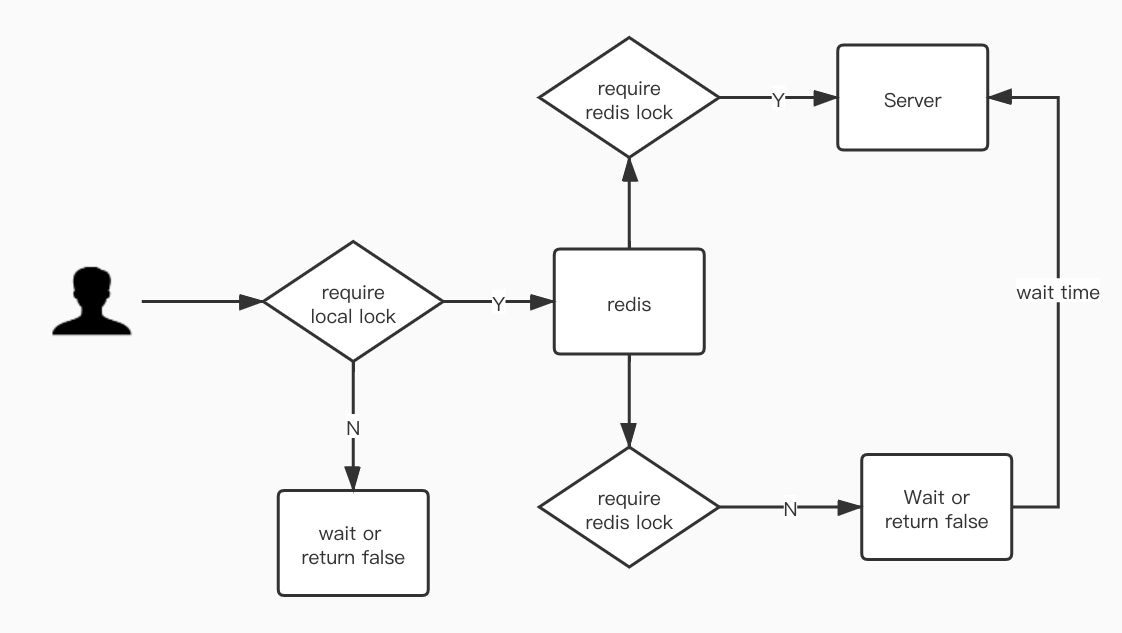this repo uses local sync lock and redis lock to provide high performance redis tools This redis kit is recommended in single redis machine.
we use our redis kit to compare with their performance in concurrent environment.
1000qps * 10 count
| machine | redisson | redis-kit | redis-kit (preload mode) |
|---|---|---|---|
| single instance (lock) | 5286ms | 5394ms | 5184ms |
| two instances (lock) | 5854ms | 6620ms | 6184ms |
| single instance (tryLock) | 1271ms | 738ms | 720ms |
| two instances (tryLock) | 2230ms | 1714ms | 1620ms |
In conclusion, redis-kit is almost as fast as redisson when using lock, but when using tryLock the redis-kit is faster about 40% than redisson.
<dependency>
<groupId>com.github.jsrdxzw</groupId>
<artifactId>redis-kit-spring-boot-starter</artifactId>
<version>2.0.0</version>
</dependency>
<dependency>
<groupId>org.springframework.boot</groupId>
<artifactId>spring-boot-starter-data-redis</artifactId>
</dependency> import com.jsrdxzw.redis.core.EnableRedisKit;
@EnableRedisKit
public class SpringBootApplication {
public static void main(String[] args) {
SpringApplication.run(SpringBootApplication.class, args);
}
}by default StringRedisTemplate which is provided by Spring is used, Of course you can choose other RedisTemplate by
yourself.
@Configuration
public class DistributedLockConfiguration {
@Bean
public RedisLockFactory redisLockFactory(StringRedisTemplate redisTemplate) {
return new DefaultRedisLockFactory(redisTemplate);
}
}use lock in your own business logic code
public class UserService {
@Autowired
private RedisLockFactory redisLockFactory;
public void method() {
RedisLock RLock = redisLockFactory.getLock("xzw");
try {
//RLock.lock(); by default the expire time is 60s
// set expire time is recommended because busy waiting may cause deadlock
// when redis machine is down..
RLock.tryLock(30, TimeUnit.SECONDS);
//RLock.tryLock(30, TimeUnit.SECONDS, 3);
// your own logic
} finally {
RLock.unlock();
}
}
}In the other way, annotations such as @DistributedLock, DistributedTryLock are also provided, please import the
spring aop at the first place before using annotations.
<dependency>
<groupId>org.springframework.boot</groupId>
<artifactId>spring-boot-starter-aop</artifactId>
</dependency>import org.springframework.boot.autoconfigure.SpringBootApplication;
import org.springframework.context.annotation.ComponentScan;
@ComponentScan
@SpringBootApplication(scanBasePackages = {"your.path", "com.jsrdxzw.redis"})
public class Application {
public static void main(String[] args) {
SpringApplication.run(Application.class, args);
}
}// @DistributedLock(lockKey = "your key")
@DistributedTryLock(lockKey = "your key", waitTime = 10)
public void method(){
//...
}we don't recommend use redis lock with @Transactional because it may cause visibility problems.
@Transactional
public void reduceStock(Long id) {
RedisLock lock = redisLockFactory.getLock("test2");
try {
lock.lock();
SkuStock skuStock = skuStockRepository.getOne(id);
Integer stock = skuStock.getStock();
if (stock > 0) {
log.info("stock is {}", stock);
skuStock.setStock(stock - 1);
skuStockRepository.save(skuStock);
}
longAdder.increment();
log.info("这是第{}个请求, 改之前的stock:{}", longAdder.longValue(), stock);
} finally {
// when lock is released by one client, the other client will
// get redis lock immediately when Transaction may not commit.
// The other client will get old value by using Mysql.
lock.unlock();
}
}we support preload mode from v1.0.4 that means the lua script is preloaded before used. it can save memory and increase performance.
# by default preload mode is disabled
redis-kit:
preload: trueit will get value from redis and if the key does not exist in redis it will do next process and put value in redis as
cache. by default the expired time is 5 minutes.
redis key can retrieve params from invoked function.
// key = id
@Cache(key = "id", expireTime = 10, timeUnit = TimeUnit.SECONDS)
public somethingVo testCache(Integer id) {
//
}
// key = ro.title + ro.name
@Cache(key = "{title + name}", expireTime = 10, timeUnit = TimeUnit.SECONDS)
public somethingVo testCache(MerchandiseGroupRo ro) {
//
}
// key = ro.title + id
@Cache(key = "{title}#id", expireTime = 10, timeUnit = TimeUnit.SECONDS)
public somethingVo testCache(MerchandiseGroupRo ro, Integer id) {
//
}
// key = "hello"
@Cache(key = "hello", expireTime = 10, timeUnit = TimeUnit.SECONDS)
public somethingVo testCache() {
//
}it will remove redis value based on cache principle -- Cache aside
it is recommended to use @Transactional annotation when modifying cache values
@Transactional(rollbackFor = Throwable.class)
@Put(key = "xzw")
public Student methodName(){
}@Delete is same as @Put
@Transactional(rollbackFor = Throwable.class)
@Delete(key = "xzw")
public void methodName(){
}it will delete value from redis
import org.springframework.beans.factory.annotation.Autowired;
@Autowired
private RateLimit rateLimit;
boolean require=rateLimit.acquire("xzw",5,10);it means we allow 5 requests per seconds, and when the request of per second is greater than 5, it will return false
we have provided three distributed limit rate algorithms:
- counter [by default]
- rolling window
- token bucket
# you can change limit algorithm by overriding spring yaml file
redis-kit:
rate-limit:
strategy: tokenBucket # default, rollingWindow
bucket-size: 100 # default is 10also, Spring AOP is used to support @Annotation features
import com.jsrdxzw.redis.ratelimit.RateLimiter;
@RateLimiter(key = "123", limit = 10, time = 10, expire = 30)
public Object method() {
}